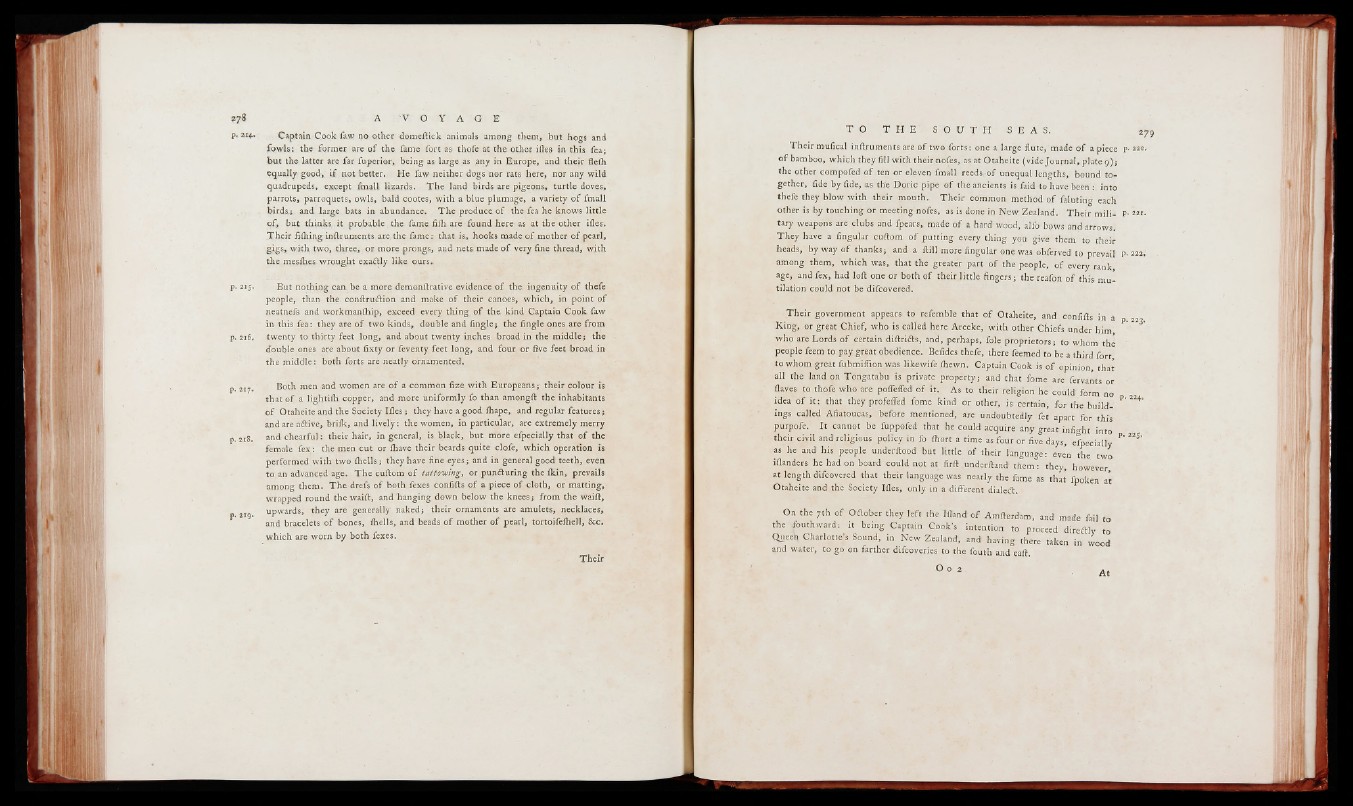
p. 254. Captain Cook faw no other domeftick animals among them, but hogs and
fowls: the former are of the fame fort as thofe at the other iiles in this fea;
but the latter are far fu-perior, being as large as any in Europe, and their ffeih
equally good, if not better. He faw neither dogs'nor rats here, nor any wild
quadrupeds, except fmall lizards. The land birds are pigeons, turtle doves,'
parrots, parroquets, owls, bald cootes, with a blue plumage, a variety o f fmall
birds.; and large bats in abundance. The produce of the fea he knows little
qf,, but thinks it probable the fame fifh. are found here as at the other iiles;
Their fUhing inftruments are the fame: that is, hooks made of mother of pearl,
gigs* with two, three, or more prongs, and nets made o f very fine thread, with
the mesihes wrought exactly like ours.
p- 215* But nothing can be a more demonftrative evidence of the ingenuity of thefe
people, than the conftrudtion and make of their canoes, which, in point of
neatnefs and workmanihip, exceed every thing of the kind Captain Cook faw
in this fea: they are of two kinds, double and iingle; the iingle opes are from
p. 216, twenty to thirty feet long, and about twenty inches broad in the middle; the
double ones are about fixty or feventy feet long, and four or five feet broad in
the middle: both forts are neatly ornamented.
p. 217. Both men and women are of a common fize with Europeans; their colour is
that o f a lightifh copper, and more uniformly fo than amongft the inhabitants
o f Otaheite and the Society Iiles; they have a good ihape, and regular features;
and are aitive, briik, and lively: the women, in particular, are extremely merry
p. 218. and chearful: their hair, in general, is black, but more efpecidly that of the
female fex: the men cut or ihave their beards quite clofe, which operation is
performed with two ihells; they have fine eyes; and in general good teeth, even
to an advanced age. The cuftom of tattowing, or pundturing the fkin, prevails
among them. The drefs of both fexes confifts of a piece of cloth, or matting,'
wrapped round the waift, and hanging down below the knees; from the waift,
upwards, they are generally naked; their ornaments are amulets, necklaces,
and bracelets of bones, ihells, and beads of mother o f pearl, tortoifeihell, &c.
which are worn by both fexes.
Their
Their mufical inftruments are of two forts: one a large flute, made of a piece p* 220,
o f bamboo, which they fill with their nofes, as at Otaheite (vide Journal, plate 9);
the other compofed of .ten or eleven fmalL reeds-of unequal lengths, bound together,
fide by fide, as the Doric pipe of the ancients is faid to have been : into
thefe they blow with their mouth. Their common method of fainting each
other is by touching or meeting nofes, as is done in New Zealand. Their mili- P - 2 2 1 .
tary weapons are clubs and fpears, made of a hard wood, alfo bows and arrows.
They have a Angular cuftom- o f putting every thing you give them to their
heads, byway of thanks; and a ftill more Angular one was obferved to prevail P- 222.
among them, which was, that the greater part of the people, of every rank,
age, and fex, had loft one or both of their little fingers; the reafon of this mutilation
could not be difcovered.
Their government appears to refemble that of Otaheite, and confifts in a
King, or great Chief, who is called here Areeke, with other Chiefs under him,
who are Lords of certain diftridts, and, perhaps, foie proprietors; to whom the '
people feem to pay great obedience. Befides thefe, there feemed to be a third fort
to whom great fubmiflion was likewife ihewn. Captain Cook is of opinion, that
all the land on Tongatabu is private property; and that fome are fervants or
flaves to thofe who are poffefled of it. As to their religion he could form no
idea of it: that they profeifed fome kind or other, is certain, for the build- P'™*'
ings called Afiatoucas, before mentioned, are undoubtedly fet apart for this
purpofe. It cannot be fuppofed that he could acquire any great infight into
their civil and religious policy in fo ihort a time as four or five days, efpecially P* ^
as he and his people underftood but little of their language: even the two
iflanders he had on board could not at firft underftand them: they, however
at length difcovered that their languag'e was nearly the fame as that fpoken at
Otaheite and the Society Iiles, only in a different dialedt.
On the 7th of o a j e b e r they left the Iffiand of Amfterdam, and made fail to
the Southward: it being Captain Cook’s intention to proceed direftly to
Qneeh Charlotte's Sound, in New Zealand, and having there taken in wood
and water, to go on farther difcoveries to the fouth and eaft.
0 0 2 At